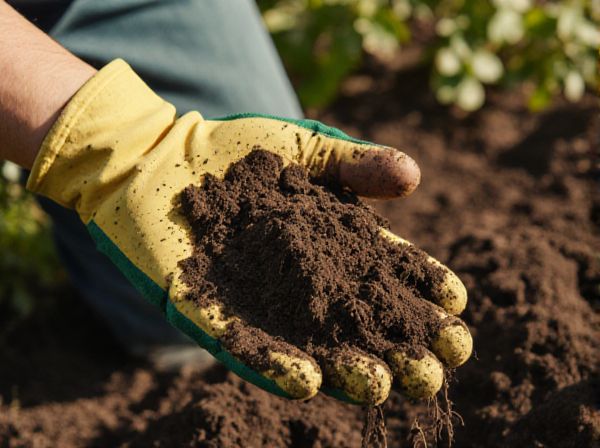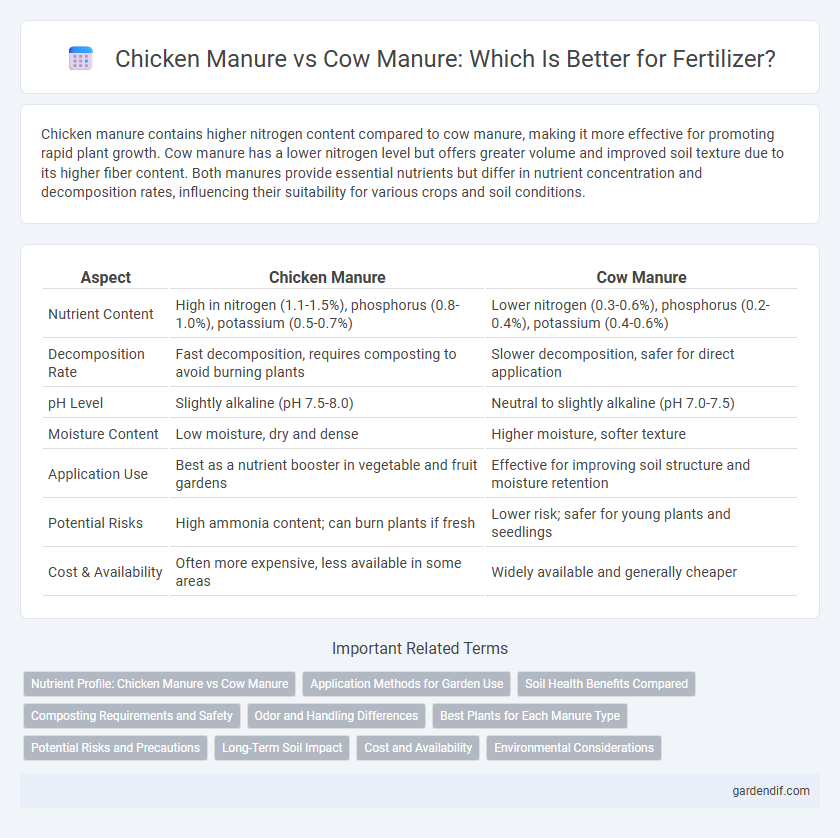
Chicken manure vs cow manure Illustration
Chicken manure contains higher nitrogen content compared to cow manure, making it more effective for promoting rapid plant growth. Cow manure has a lower nitrogen level but offers greater volume and improved soil texture due to its higher fiber content. Both manures provide essential nutrients but differ in nutrient concentration and decomposition rates, influencing their suitability for various crops and soil conditions.
Table of Comparison
| Aspect | Chicken Manure | Cow Manure |
|---|---|---|
| Nutrient Content | High in nitrogen (1.1-1.5%), phosphorus (0.8-1.0%), potassium (0.5-0.7%) | Lower nitrogen (0.3-0.6%), phosphorus (0.2-0.4%), potassium (0.4-0.6%) |
| Decomposition Rate | Fast decomposition, requires composting to avoid burning plants | Slower decomposition, safer for direct application |
| pH Level | Slightly alkaline (pH 7.5-8.0) | Neutral to slightly alkaline (pH 7.0-7.5) |
| Moisture Content | Low moisture, dry and dense | Higher moisture, softer texture |
| Application Use | Best as a nutrient booster in vegetable and fruit gardens | Effective for improving soil structure and moisture retention |
| Potential Risks | High ammonia content; can burn plants if fresh | Lower risk; safer for young plants and seedlings |
| Cost & Availability | Often more expensive, less available in some areas | Widely available and generally cheaper |
Nutrient Profile: Chicken Manure vs Cow Manure
Chicken manure typically contains higher concentrations of nitrogen, phosphorus, and potassium compared to cow manure, making it a more nutrient-dense fertilizer suitable for fast-growing plants. Cow manure offers a balanced nutrient profile with lower nutrient content but adds significant organic matter, improving soil structure and moisture retention. The slow nutrient release in cow manure provides long-term soil enrichment, whereas chicken manure's rapid nutrient availability benefits immediate plant growth needs.
Application Methods for Garden Use
Chicken manure provides high nitrogen content, making it ideal for vegetable gardens when composted properly to avoid burning plants; it is often applied as a dry, aged fertilizer or diluted liquid manure. Cow manure, lower in nitrogen but rich in organic matter, is best used as well-aged compost to improve soil structure and moisture retention, applied by spreading evenly around plants or mixing into the soil. Both manures require careful application timing, usually before planting or during early growth stages, to maximize nutrient availability and prevent plant damage.
Soil Health Benefits Compared
Chicken manure contains higher nitrogen, phosphorus, and potassium levels compared to cow manure, promoting rapid nutrient availability for soil enrichment. Cow manure offers greater organic matter content, enhancing soil structure and moisture retention over time. Using chicken manure improves nutrient density quickly, while cow manure supports long-term soil health through consistent organic matter integration.
Composting Requirements and Safety
Chicken manure requires longer composting periods, typically 6-12 months, to reduce high ammonia levels and pathogens, ensuring safe application. Cow manure composts faster, around 3-6 months, due to its lower nitrogen content and moisture, posing fewer risks of burning plants or transmitting diseases. Proper temperature control above 55degC (131degF) during composting is critical for both to neutralize harmful microbes and stabilize nutrients.
Odor and Handling Differences
Chicken manure emits a stronger, pungent odor compared to cow manure, which tends to have a milder and less offensive smell. Handling chicken manure requires more caution due to its higher ammonia content and potential to cause respiratory irritation, whereas cow manure is generally easier to manage with less risk. Proper composting of chicken manure is essential to reduce odor and pathogens, while cow manure can often be applied more directly with minimal preparation.
Best Plants for Each Manure Type
Chicken manure, rich in nitrogen, phosphorus, and potassium, is ideal for fast-growing, nutrient-demanding plants such as corn, tomatoes, and peppers. Cow manure contains a balanced nutrient profile with lower nitrogen levels, making it suitable for leafy greens, root vegetables, and ornamental plants that require steady, slow nutrient release. Using the correct manure type enhances soil fertility and optimizes plant growth according to specific nutrient needs.
Potential Risks and Precautions
Chicken manure contains higher nitrogen levels, which can lead to nutrient burn and groundwater contamination if over-applied, while cow manure has lower nitrogen content but may harbor pathogens like E. coli. Both manures require proper composting to reduce harmful microorganisms and stabilize nutrient availability. Precautions include testing soil nutrient levels, applying manure at recommended rates, and incorporating it into soil to minimize runoff and odor issues.
Long-Term Soil Impact
Chicken manure contains higher nitrogen and phosphorus levels than cow manure, promoting faster nutrient availability but risking nutrient buildup if overused. Cow manure, with its balanced nutrient profile and higher organic matter content, enhances soil structure and microbial activity over time, supporting sustained soil fertility. Long-term application of cow manure contributes to improved soil moisture retention and reduced erosion compared to chicken manure.
Cost and Availability
Chicken manure is generally more expensive than cow manure due to its higher nutrient content and demand in organic farming. Cow manure is widely available and often cheaper, especially in regions with extensive cattle farming. Both types differ in application rates, making cost-effectiveness dependent on specific crop nutrient needs.
Environmental Considerations
Chicken manure contains higher nitrogen levels than cow manure, which can lead to increased ammonia emissions if not managed properly, impacting air quality and contributing to odor issues. Cow manure typically releases fewer greenhouse gases per unit of nitrogen but can produce methane during decomposition, influencing its environmental footprint. Proper composting and application techniques are essential to minimize nutrient runoff and reduce the ecological impact of both types of manure in sustainable agriculture.
Chicken manure vs cow manure Infographic

 gardendif.com
gardendif.com